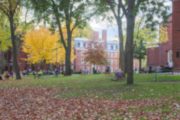
In the year 2000, there were just two college centers or institutions devoted to promoting conservative or free market ideas to America’s undergraduates. Today, there are about 150 such centers, whose activities include offering courses in free market economics, awarding fellowships and scholarships, sponsoring research, staging debates, and distributing such books as The Road to Serfdom by Friedrich Hayek, Atlas Shrugged by Ayn Rand, Free to Choose by Milton Friedman, The Law by Frederic Bastiat, and other pro-capitalist classics.
All this represents a major change on American university campuses: the creation of privately funded centers and institutes that promote the traditional knowledge and perspectives that were once at the heart of the university. The creation of such centers, for the benefit of undergraduates, began with the formation of the James Madison Program at Princeton University in 2002, dedicated “to exploring enduring questions of American constitutional law and Western political thought.”
According to the Chronicle of Higher Education, most of the centers are financed by a few major donors. Among the largest are the North Carolina-based BB&T (Branch Banking & Trust) Foundation, the Pennsylvania-based Jack Miller Center, the Manhattan Institute’s Veritas Fund, and philanthropies associated with the billionaire activist brothers David H. Koch and Charles G. Koch.
The BB&T Corporation is one of the largest financial services holding companies in the United States. In partnership with EverFi, the country’s leading education technology company, BB&T’s programs provide interactive financial education to students. Their aim is to promote financial literacy.
The Jack Miller Center is, according to its website, “an operating non-profit dedicated to the support of initiatives in higher education focused on cultivating a deeper understanding of the fundamental principles at the heart of American civic, cultural, and constitutional life.”
The Veritas Fund “is a donor-advised fund that seeks out professors at top-tier universities who are committed to bringing intellectual pluralism to their institutions. The general objective of these programs is to give students a different view of Western civilization and American economic and political institutions than the critical approach taken toward these subjects in most college curricula.”
What is significant is that these conservative centers are not only financially well supported and strongly pro-capitalist, but they also add to a university’s prestige. The data about these centers was revealed in a report, “Renewal in the University: How Academic Centers Restore the Spirit of Inquiry” by Jay Schalin, director of policy analysis at the John William Pope Center for Higher Education Policy. The Chronicle of Higher Education states:
Big donors, the report says, “have the leverage to negotiate the terms that can keep centers safe from faculty control at schools where the faculty is antagonistic to their missions…. Clemson University’s Institute for the Study of Capitalism, described in the report as “the crown jewel” of centers supported by BB&T, offered 18 courses in history, political science, and philosophy last year and plans in the fall to offer annual scholarships of up to $10,000 to 10 freshmen to take eight courses together over four years.
The donors have gone about creating these centers quietly because they know that the universities’ Marxist, left-wing, politically correct professors would organize resistance to them and dissuade their students from going near them. Such professors have already turned most of their students into socialists, and they don’t want them to know what socialism really is.
Conservative blogger Bill Whittle, in a recent speech at the Silicon Valley Conservative Summit, explained how he deals with left-wing students at universities. He asked a class of 10 students how many of them were socialists. Seven raised their hands. He then asked how many wanted to be left alone by their government, or constantly told what they can and can’t do. They all wanted to be left alone.
Obviously, these students had no idea what socialism was really about. He then asked how many of them believed in the socialist tenet of “from each according to his ability; to each according to his need.” The socialists said they did. He then asked how many of them owned iPods. They all did. He then proposed that they all place their iPods in a basket on the desk, then convert them into cash at a pawn shop and distribute the cash to the poor.
Not one iPod was donated. The students all believed in private property — a tenet of capitalism, not socialism. All of which proved that the socialism they had adopted was a benign version preached by their professors. They were not told that the essence of socialism was economic equality such as exists in Cuba, where everyone lives in poverty. All they were told about that island paradise is that education and healthcare are free for everyone. But Whittle told them that there is no such thing as free education and healthcare. Someone is paying for them. The government of Cuba paid for them. And where did the government get its money? From taxes.
What Whittle proved is that our undergraduate socialists have been superficially indoctrinated by clever professors who prey on the ignorance of their students. As long as they can get them to vote for pro-socialist politicians, the professors have done their job.
Conservatives have finally found an effective way to make inroads into America’s liberal universities. Schalin writes that these academic centers, financed entirely by outside donors, “can melt the heart of university administrators” of any ideological leaning. C. Bradley Thompson, director of the Clemson center, made it clear to the university’s administration that “we were not going to be shunted to some dark corner of the university. We were not going to be ghettoized.”
To help expand its audience, Thompson said, the Clemson center frequently hosts debates. “We have remained steadfast to our principles,” he said, “but we have done it in a way that is collegial and inviting.”
In order to turn students away from these anti-socialist centers, liberal professors are dredging up the usual smear tactics to demonize the centers as controlled by “major political bankrollers” with sinister intentions. But the openness of the centers will surely attract the more inquisitive students, who may discover to what extent they’ve been indoctrinated by their left-wing professors.



